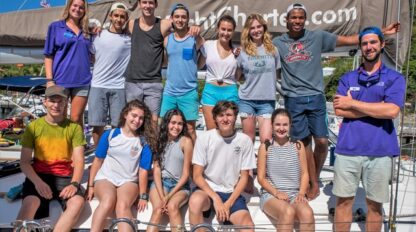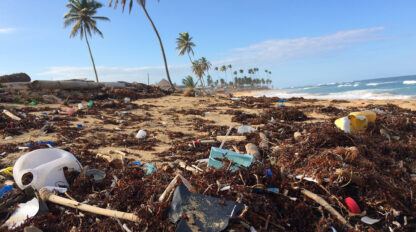Becoming a Divemaster


Megan Herring joined Sail Caribbean’s marine biology camps last summer as a member of the Sierra crew, where she had the opportunity to explore her interests in marine science, research, and scuba diving. Along with applying to colleges she has decided to add an extra challenge to her final semester of High School. She is taking her diving to another level and is currently training for her Divemaster certification. In college she hopes to study Biology and English (with a focus on Journalism). Megan has combined many of her interests and skills and has written an excellent introduction into the world of becoming a Divemaster.


Being a Divemaster is awesome, but isn’t all fun and games. In fact, it can be a bit tough at times. Well first off, everyone knows how heavy those blasted tanks are (especially when full!), and it’s the duty of a hard-working Divemaster to remove empty tanks and hobble back over to the boat with a fresh load. Also Divemasters need to be masters of navigation because recreational divers count on them to make it back to the boat, not to surface and search for it. Like any job, there’s a great deal of customer service involved. A Divemaster in training can expect to work closely a wide variety of people as they work hard to allow recreational divers the chance to see the incredible ecosystems below the water’s surface. If you think you can handle these responsibilities and have fun doing it, this could be your job too!
 Becoming a Divemaster is a multi-step process that can be done in as little as a couple of weeks of intensive instruction and diving or over time when your schedule allows (if the Instructor is cool with this). Signing up can be expensive… Ouch! Check to make sure what your fees cover, many times you’ll need to buy the course materials separate. The course materials usually come in a cool bag that you can proudly carry around with “Divemaster” neatly embroidered on the side. If you’re in school now, the books aren’t too hard to get through; some old-timers might need to brush up on their study skills though! There are 4 tests to take after you go over the materials with your instructor.
Becoming a Divemaster is a multi-step process that can be done in as little as a couple of weeks of intensive instruction and diving or over time when your schedule allows (if the Instructor is cool with this). Signing up can be expensive… Ouch! Check to make sure what your fees cover, many times you’ll need to buy the course materials separate. The course materials usually come in a cool bag that you can proudly carry around with “Divemaster” neatly embroidered on the side. If you’re in school now, the books aren’t too hard to get through; some old-timers might need to brush up on their study skills though! There are 4 tests to take after you go over the materials with your instructor.

training dives to complete. You’ll get to supervise and help students as they get their open water certification, map out dive sites, and even lead dives with advanced students. You’ll have to get your skills down pat – you’re the expert now and there’s no faking it! One of the coolest but trickiest dives is when you trade ALL of your gear with your dive buddy while underwater. It can get pretty hilarious, leading to some long laughs and a healthy dose of frustration. All of this time you’re under the watchful eye of your dive instructor who is keeping track of your progress.

Becoming a Divemaster is a fun but serious business. It’s certainly not the job or lifestyle choice for everyone, but if you love to dive and want to make it more than a hobby, I encourage you to get out there and do it! You can be proud when you finish your final test and complete that final skill. Now you are ready to go to work at exotic locations all over the world….or to get a part time job at your local dive shop. Regardless of how you use your new certification, remember this: it will be the time of your life!


